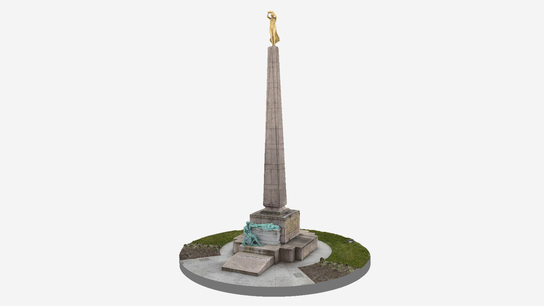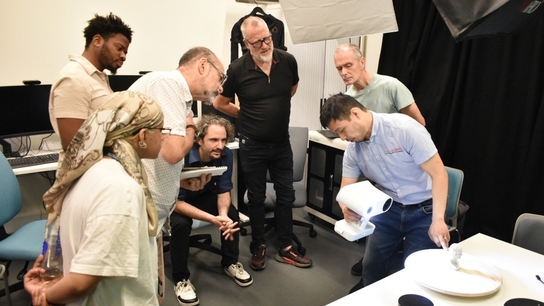Digitizing Bengaluru’s ancient inscriptions with Artec 3D
Challenge: Stumbling upon the rich history that was scattered around Bangalore, India, an IT professional decided to look deeper into retracing what was known about these ancient stones, what more we could learn, and how we could safely digitize them for today and the future.
Solution: Artec Space Spider, Artec Studio
Result: In addition to a full-scale preservation project, as well as a book, the digital documentation of ancient, historical stones continues, with all surfaces being captured in high resolution, no relics damaged or compromised, and 3D models made accessible to students and researchers.

Look closer: Each stone is covered with beautifully detailed writing, now captured by Artec Space Spider
It all began in 2017, when Udaya Kumar P.L., Honorary Project Director of the research institute Mythic Society, stumbled upon an old stone tablet in his neighborhood. His interest was piqued, and he decided to investigate further – and it’s a good thing that he did. The stone he found turned out to be an 8th-century artifact, and it was one of many: there were around 175 inscription stones all over the city of Bengaluru, many of which were over a thousand years old.
“I had goosebumps seeing and touching 1,300-year-old writing within walking distance of my home,” said Udaya. “I had no idea that there was something that incredible so close by! I wanted all friends and Bengalureans to experience the same thrill.”
With neither historical nor archaeological communities actively working to protect these inscriptions, being more focused on book-based research, Udaya decided to step up to the challenge.
“The writings on the stones are an original record of a significant event at that exact place, at that point in time,” Udaya explained. For example, commemorating events such as the building of a village, a temple, a ruling era, a record of an eclipse. These inscriptions are essentially the city’s history written and woven through its streets from a thousand years ago.
“These stones were orphaned and abandoned as people living around them did not know what was written on them and did not understand their importance,” Udaya said. “Seeing this sorry state of affairs, I decided to step in and help save these incredible millennium-year-old inscriptions in Bengaluru city.”
“Due to the lack of easily available and accurate information, it is very important to educate people, and to make them more aware of their locality, and the importance of preserving these spaces and stones – furthermore, these inscriptions are a source of how the language has evolved over the centuries.”
Forming a group of like-minded enthusiasts, a thriving and still-active community of heritage explorers was born, and they had one mission in mind: to discover, digitize, and preserve the historical wonders that dotted their city.
Preserve what you see
As an IT professional with three decades of experience working with household names such as Schneider and General Electric, for Udaya, the bridge between what started out as a hobby and his profession wasn’t a hard one to cross.
“Historians have been searching for these stone inscriptions and documenting them in journals for a hundred and fifty years,” said Udaya. “What I do – revisit such sites and ensure physical protection and digital conservation.”

Discovering parts of history around the city
With a clearly set goal, Udaya and his fellow history hunters got to work. Beyond the 175 inscriptions that have been discovered within the city of Bengaluru, there are some 1,500 in surrounding rural areas. Carved with a chisel and hammer, these inscriptions can be found on all kinds of stones: cut and finished slabs, boulders, stone walls, or sculptures, and date back from the 5th to the 16th centuries. What needed to be done next: to thoroughly capture everything they found.
“It was very evident,” Udaya said, “that physical conservation alone was insufficient, as stone surfaces weather due to natural causes such as rain, sun, corrosion, etc.” And no matter how well protected an inscription may be, there was always the risk of accidental damage. It was at this point that Udaya and his team began looking into making digital copies of the ancient relics.
The stones are generally found in a terrible state withstanding weather conditions. Some are worn out, some mishandled, and with Bangalore’s rapid urbanization – the threats of destruction by any means are inevitable.
“I experimented with techniques such as photogrammetry and Reflectance Transformation Imaging,” said Udaya. “These techniques, though affordable and accessible, were inadequate and geometrically poor – and so we evaluated commercial handheld scanners for the task. And while other 3D scanners gave us a similar resolution, having to add markers was ruining the purpose of realistic preservation.”
Artec 3D Gold-certified partners in India, Altem Technologies, were ready to lend their expertise. “The main objective was to capture the letters of the inscriptions in as much detail as possible,” Altem representative Lakshmikantha Sharma said. “For example, some features to be captured are as small as 0.3 mm or less.”
Besides writing, many stones had intricate drawings carved into them – for example, this one of a man charging into battle.

Every tiny detail is captured with the Artec Space Spider
When it comes to heritage preservation especially, 100% contact-free 3D scanning is essential. Much like in a museum, fragile pieces of history and irreplaceable artifacts are best left seen, and not touched. At the same time, the quality of the results you hope to achieve needn’t be compromised. It’s here that the features of Artec 3D scanners come through – and in this case, it was the Artec Space Spider that was chosen as the ideal tool for the job.
Designed especially for capturing complex geometries and fine edges such as these, the Artec Space Spider’s blue-light technology leads to stunningly accurate 3D models with super-high accuracy and brilliant color. And with an accuracy of 0.05 mm, there’s nothing this machine misses.
“The scanning results of the Space Spider were so clear that even chisel-depth path marks by the sculptor are visible in the scanned data!” Udaya said.
Diving into the past
Once the method was selected – quickly capturing stones with Artec Space Spider and processing them in Artec Studio to forever immortalize these striking pieces of history – the road ahead was clear: to scan every stone they found.
“First, the 3D scanning team would pre-identify scanning locations and document the availability of the resources available to carry out the scanning,” recalled Sharma.
“Scanning was carried out in various outdoor conditions: from open land under shade, in sunlight, in forested areas where small shrubs are growing around – mostly, in conditions where there is no or minimal power supply.”

Resources were often limited, but all that was needed: A trusty Space Spider!
Despite often tricky or precarious settings far from general resources, the scanner’s ease of use took the team a long way. “Space Spider comes in very handy, and is very easy to use, among all our team members,” Udaya said. This ease of use has led to uninterrupted work when capturing the treasured stone, too. “In one stretch,” he said, “we can scan for meters of length over the stones, without any lag or break.”
Processing in Artec Studio was a breeze, too. “The software is very effective in managing high size point data of projects,” Udaya said.

Scanning with Space Spider no matter the weather!
“Huge datasets of 15-30 GB are aligned in Artec Studio using the Alignment option. Artec Studio handles huge data during Global registration so perfectly, it re-aligns if there is any positional difference or error between the scan sets,” said Sharma. “Then, with the help of Sharp fusion, final 3D models will be created in 0.1-0.2 mm resolution to create extremely accurate models for digitization purposes.”
Essential preservation
So far, about 500 stones have been scanned. And the plan? “To scan at least 1,500 documented inscriptions and hero stones in and around Bangalore, many of which are in danger due to rapid urbanization,” Udaya described.

3D models are freely accessible to all who may want to see or use them
While the team is also at work to relocate the stones to safer locations more suited for preservation, and has plans to restore those that have been damaged, digitizing them first is essential.
In one case, a model was 3D printed at a reduced size and used as a pattern to help cast bronze copies. These replicas were then used to raise funds to erect an intricate stone shelter for Bengaluru's oldest inscription from the 8th century.
And this data will be shared freely, too – with researchers, on Wikimedia Commons, with schools, and others. What it all comes down to is the availability of information, the documentation of history for generations to come, and accurate visual resources that can easily be accessed and referred to.

Students are taught the history of their city. Image from Altem Tech.
The importance is clear, and the method has been set: The only way to protect these historic stones? “By 3D scanning,” said Sharma, “while our team continues to work on digitizing them in as minute detail as possible for future generations.”
“While the contents of the inscription stone may have been published in academic journals, almost no one living in and around the site of an inscription stone knows what is written on it, and its value,” Udaya said.
And that’s why they’re now taking this mission into classrooms, too.
“We conduct awareness events in schools, colleges, and neighborhood gatherings where we educate people about these inscriptions,” Udaya said – showing how already, history is being brought back from the past, and spread in the classrooms of today, and safely stored for the future.
Scanners behind the story
Try out the world's leading handheld 3D scanners.





